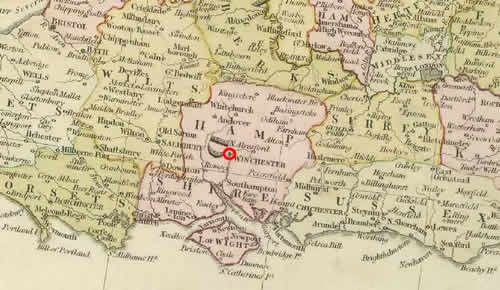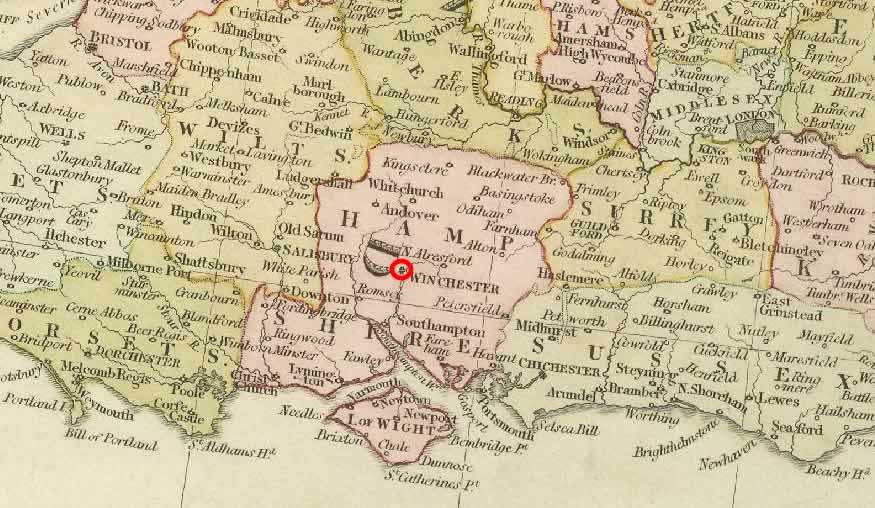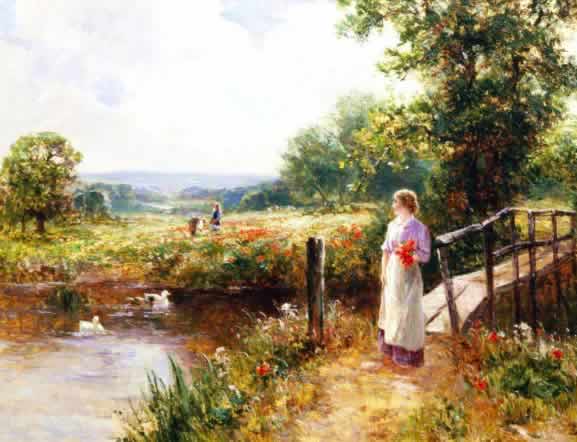21 September 1819: Quiet Power, an Odd Sort of Life, Independence via Hyperion, & Uncertainty
Winchester


Keats, not too far from his twenty-fourth birthday (31 October), has been in Winchester since 12 August with his closest friend Charles Brown, with whom he has been co-writing a play, Otho the Great. They complete it, but despite high hopes—Keats at moments believes it will lift him out of a reputational and monetary hole—the tragedy remains unperformed during their lifetime.
September also sees Keats meet yet again with the manager of his family’s trust, Richard Abbey; the Keats siblings are generally in the
dark about their complete assets, which includes a significant chunk of money held
by the
courts. Keats hopes
to help his brother—George—who, with his wife, has experienced a financial collapse in America. Keats,
too, faces continuing and severe money troubles. Brown has supported him for last
few months,
and Keats is greatly thankful to him for his selflessness and generosity, if not a
little
guilty about it (letters, 22 Sept). Without Brown, Keats says he would have been in
personal distress
(letters, 26 Oct). Keats also receives loans from other friends
early in the month, and he has (unsuccessfully, it seems) asked others to return loans
that he
himself has made when he couldn’t really afford to.
In early September, Keats completes Lamia, a kind of tragic romance imaginatively lifted from Burton’s The Anatomy of Melancholy. He believes it may, with its beautiful
serpent-woman and combination of love, enchantment, and grief, have enough fire in it
to at least have popular appeal and leave readers with some strong sensation (18 Sept,
to the
George Keatses). At the same time, Keats in the poem manages to cover one of his favorite
topics in the poem: the division and difficult conflation of the real, the ideal,
and
illusion. But again, at bottom, Keats hopes to make some money from the poem, despite
his
ambivalence about the very idea of popularity. In fact (and not unnoticed by friends,
particularly his publisher John Taylor), his
attitude toward the public often borders on contempt. This, of course, can happen
when the
larger reading public shows little interest in your work. Keats, too, hopes that his
more
meaningful poetic accomplishment will not be to have conversations with popularity
for the
present, but with the enduring voices of posterity.
Lamia will become the lead
title name in a new volume of poems that Keats is anxious to publish, though the collection
does not appear until June 1820: Lamia, Isabella, The Eve of St.
Agnes, and Other Poems. The first two poems that title the volume are not Keats at
his very best. In fact, Keats did not want Isabella published in the
collection at all: he feels it reflects inexperience, simplicity, and weakness; his
editors
will eventually over-rule. He writes to Richard
Woodhouse, his friend and sometimes literary advisor, that he thinks it is the kind
of poem best published after one’s death
(22 Sept). Keats likely recognizes that Isabella,
written about a year-and-a-half earlier, in some ways looks backwards in terms of
his poetic
progress.
The 1820 volume ends with Hyperion: A
Fragment [Book I; Book II; Book III], a poem that Keats
substantially gives up on in April 1819. Keats had taken up the story of the titans
again, in
July, only to give up on it a second time (in what we know as The Fall of Hyperion) this September.
Keats’s desire to make something significant from the Hyperion story does rouse some
very
strong poetry and mark obvious progress—for some, it is his best work. But for Keats,
in
assessing what he has thus far done, he discovers in the work a conflicted engagement
with
John Milton’s style, one that tests his own
poetic judgment and character: as Keats critically cross-examines the poem in a letter
to his
friend and fellow writer John Hamilton Reynolds
on 21 September (and repeated to the George Keatses three days later, in saying he
is on my
guard against Milton
), he expresses his desire to find and use a genuine, English idiom
(which, he believes, Thomas Chatterton
possesses in its purest form), and not one modelled on Greek and Latin inversions and
intonations.
He makes a crucial distinction between poetry that displays its artfulness
too conspicuously, and poetry that originates from authentic feeling and sensation,
and with
more natural style; as he puts it, he worries over the difficult division of the false
beauty proceeding from art
and the true voice of feeling.
And so, he concludes,
I have given up Hyperion.
A possible translation of his comment: I have given up
emulating John Milton and am determined to become John Keats.
We witness here how far Keats has come in his progress over the last year, where the critical subtleties of these self-assessments and the desire for clear, poetic independence are enough for him to put aside a poem into which he has poured much effort. But in the end, even with the changes Keats makes over his two attempts at the poem, he appears conflicted over the aims of epic, allegory, and lyric, and he seems stymied over what in The Fall of Hyperion he might poetically articulate about how to enter and address the human world of suffering through the imagination.

Contending with this distinction between false beauty
and the true voice of
feeling
is, in fact, how Keats manages the final stage of his poetic progress, and how
he has, for even less than a year, been able to rise significantly above his early
poetic
efforts. Perhaps, too, the status associated with completing a long poem (approximating
the
classical, epic narrative) sidetracks the focused conflation of calmness and intensity
that
characterize his greatest and more condensed efforts in the lyric mode, and, in particular,
in
his extraordinary odes of 1819, culminating in the poem that is, perhaps, most assuredly
natural and balanced in its voice—To Autumn. None of this, however, diminishes the remarkable possibilities in
Keats’s abandoned version of fall and suffering in the Hyperion story, and also of
his longest
continuing subject: the role of the poet. One of Keats’s friends, the artist Joseph Severn, will, upon hearing that Keats has
abandoned the poem, strongly encourage him to complete it.
Keats does venture some thoughts on the nature of his poetry, when, on 20 September
to the
George Keatses
, he writes about the difference between himself and
Lord Byron: while Byron writes about what he
sees—I describe what I imagine—Mine is the hardest task.
Keats is quite right in the
first instance, though the issue of the relative difficulty of portraying the two
is of course
questionable, since both the real and the imagined can be equally troubling to engagingly
represent. (The comment no doubt also closets a little jealousy over Bryon’s stunning
popularity.) Keats goes on to write that the nature of his poetry in fact makes some
reviewing
quarters fearful of or shy about actually addressing his poetry, since it might challenge
or
puzzle their tastes and, at most, their beliefs. Keats here acknowledges the political
dimension of contemporary poetic tastes and prejudice, something he knows quite a
bit about,
especially as a result of his public affiliation with Leigh Hunt and his circle in the earlier phase of his writing career. Mind you, the
vast majority of reviews of his poetry written while Keats is alive are neutral or
favorable.
Keats does not see himself as what today we might label a fully transgressive poet
(his
attraction to classical forms and subjects are very clear), but, as mentioned, he
recognizes
the significant political tensions that were underwriting much of the cultural discourse
of
his day. His best poetry, he hopes, transcends politics, tastes, prejudice, and those
tensions. John Scott a deep reader of Keats, and
one who knew as much as anyone about the political poetics of the time (and who, in
fact, died
for them), makes it very clear: in a tough-minded review of Keats’s final collection,
and in
condemning both the right and left for inserting party politics into their criticism,
Scott
writes, Keats is not a political poet
(London Magazine,
Sept. 1820).
Though Keats recognizes that ambition now and then haunts him, on 21 September, in
writing to
the George Keatses
, he musters a self-assessment that looks back upon his
previous disposition and temperament and points to a new one: he recognizes that he
may have
lost some poetic ardour and fire,
but it has been replaced by more thoughtful and
quiet power.
He is more content to read and think,
and not to over-exert himself
with vexing speculations.
He no longer wishes to write verses for the fever they
leave behind. I want to compose without this fever.
This, once more, is a far cry from
early Keats, who, for example, in Sleep and Poetry (written late 1816),
pictures himself earnestly grasping his pen in order to write something, anything—in
order to
feed upon and fully dedicate himself to whatever inspired and sustained his great
precursors;
his only saving grace for such youthful exuberance is that he momentarily sees his
goals as
presumptuous.
What Keats writes on 21 September to Reynolds
shows a moment of reflection on his last few years—the years, that is, he proclaims
and pushes
his poetic ambitions: I have led a very odd sort of life—Here & there—No anchor—I am
glad of it.
Keats seems, at least for the moment, to accept his unsettled, insecure
lifestyle—but one that attunes him to probing and weighing the larger unsteadiness
of life
while always focused on his primary directive: his dedication to and humility toward
the
Principle of Beauty.
*
Keats’s uncertainty about his future is fully apparent in a letter he writes the next
day, 22
September, to another friend and supporter, Charles
Dilke. He attempts to put on a brave face to divert something close to desperation.
Acknowledging his lack of success as a poet (and his mistrust of poetry in general),
and
making it clear that his finances are worn terribly thin, Keats reaches for a jocular
tone; he
writes that he is on the lookout for connections so that he might earn something of
a living
by writing for periodicals, a job he fully despises and mocks for its generally vacant
credibility. Half joking, he writes he is confident he can shine up an article on anything
without much knowledge of the subject, aye like an orange.
But behind the humour lurks
his real situation: he needs to be able to live cheaply, and he needs to earn some
money. And
soon. The letter manages to carry some of the playful Keatsian tone we see at lighter
moments
in his letters, when he is humorously self-conscious of his own thinking, ideas, and
personality. And popping up at one moment is the hyper-sensuous poetic self who has
some
verbal fun pushing up against luxurious excess: to Dilke he pictures himself writing with
one hand, and with the other holding to my Mouth a Nectarine—good God how fine. It
went down
soft, pulpy, slushy, oozy—all its delicious embonpoint melted down my throat like
a large
beatified Strawberry.
September, then, is a month of some abandonments and misgivings and doubt, though,
with that
sense of thoughtful and quiet power,
it also, as mentioned, marks the composition of
his consummate poem—To
Autumn—and therefore, in a way, the end of his progress as we know it; it is his
last truly notable poem before circumstances compromise further advancement. Keats
had no idea
he had saved his best for last.
*Keats notes this not just in few letters (9 April 1818 to Reynolds; February 1820 to Fanny Brawne [I have lov’d the principle of beauty in all things
], but of
course it emerges as a quiet truism in the famous opening line of Endymion, as the lasting property that lifts us from and counters our all-too-human
darkness: A thing of beauty is a joy forever.

